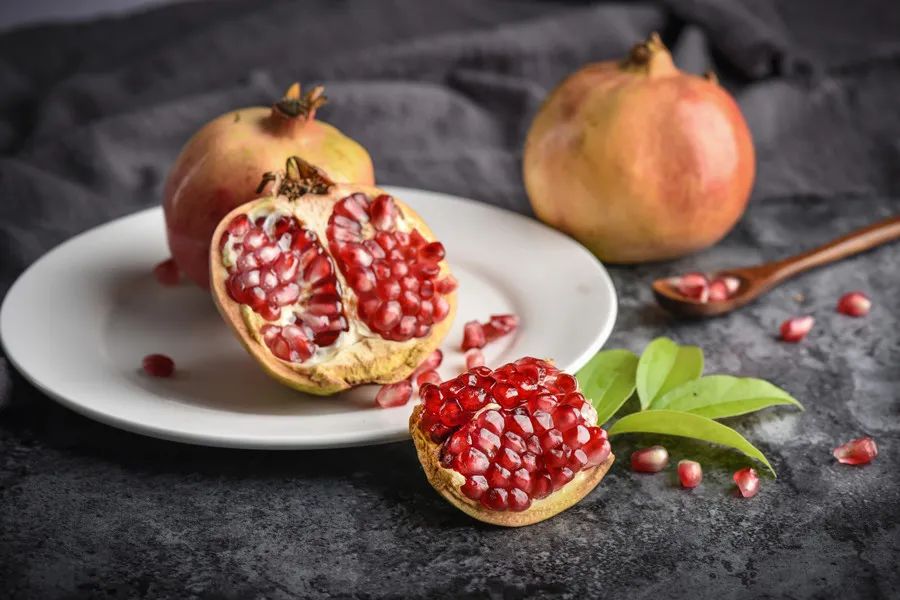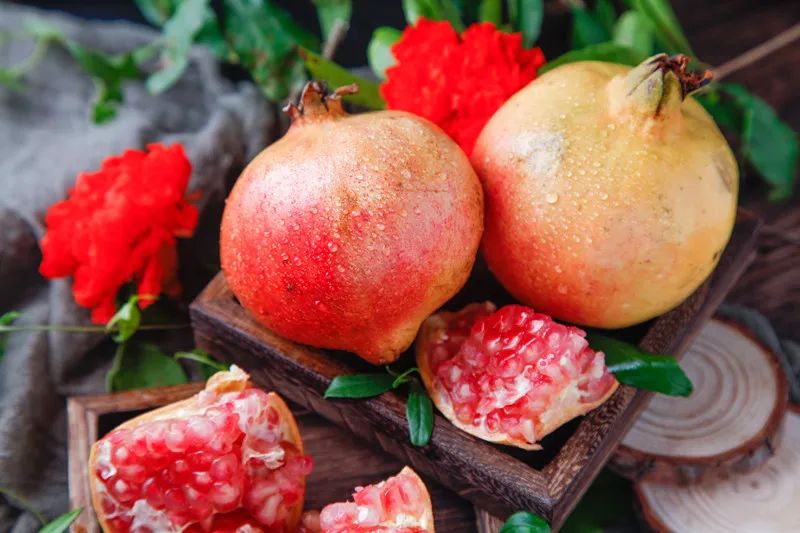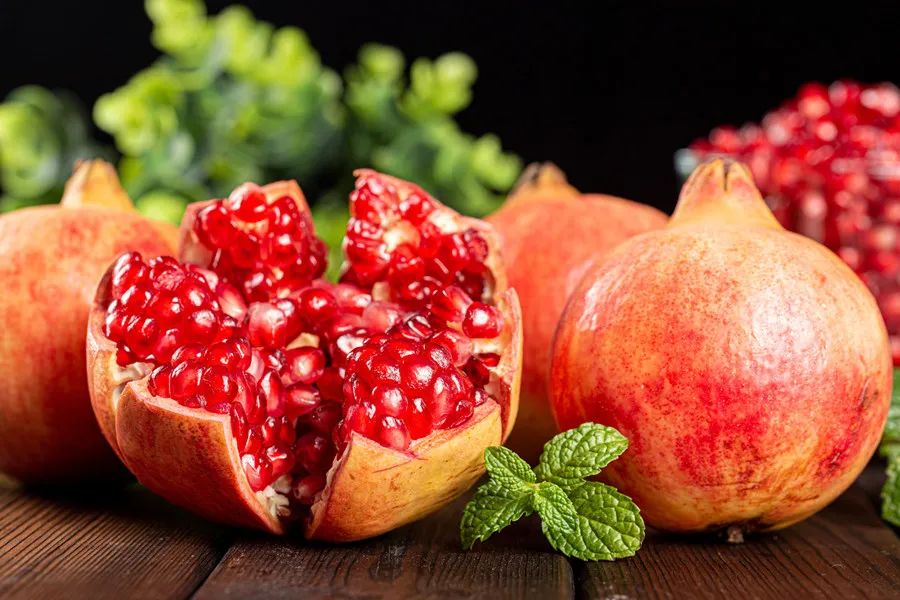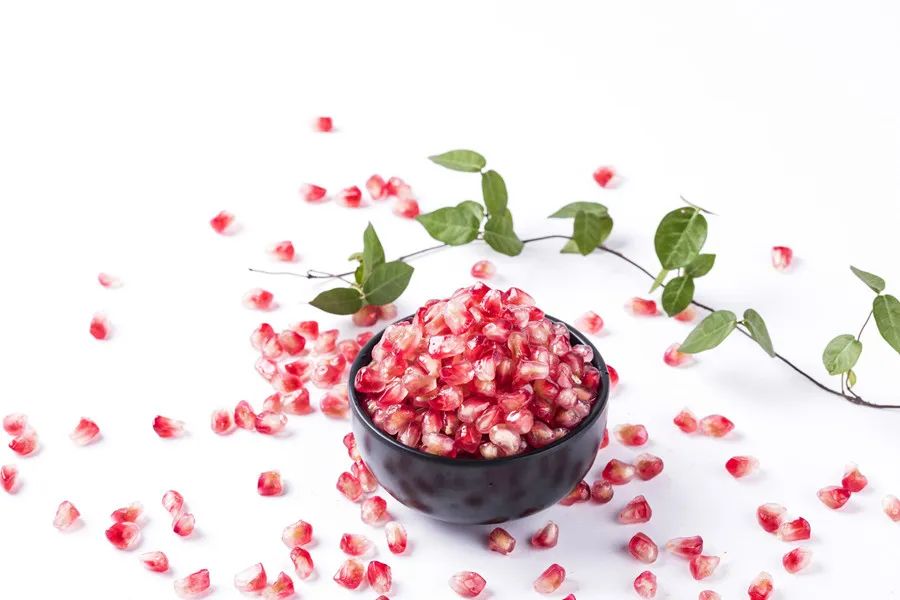Pomegranate: The "Golden Fruit" for Autumn Wellness
Pomegranate: The "Golden Fruit" for Autumn Wellness
Autumn is the perfect season for pomegranates, as they ripen and become widely available. With their plump, ruby-red seeds and sweet-tart flavor, pomegranates are not only a delight to the palate but also a powerhouse of health benefits. In traditional Chinese medicine (TCM) and dietary therapy, they are revered as the “golden fruit” for autumn health.
Symbolism of Pomegranates in Chinese Culture
Pomegranates have long been considered auspicious symbols in Chinese tradition. Known for their abundant seeds, they represent prosperity and fertility. In many regions, pomegranates are placed in newlyweds' homes to signify blessings for many children and a harmonious future. During the Mid-Autumn Festival, the fruit's vibrant red flowers and glistening seeds symbolize happiness and success in life and career.

Pomegranate: A Nutritional Treasure
Nourishing and Moisturizing
Pomegranate seeds are juicy and flavorful, offering a sweet yet slightly sour taste. According to TCM, pomegranates are warm in nature and affect the lungs, kidneys, and large intestine meridians. They are praised for their ability to:
Quench thirst
Retain body fluids
Relieve dryness
Stop diarrhea and bleeding
The Chinese Materia Medica also records that pomegranates can “quench thirst and alleviate dryness in the throat,” making them ideal for combating autumn dryness.

Modern Nutritional Profile
Rich in organic acids, sugars, proteins, fats, vitamins, and minerals like calcium, phosphorus, and potassium, pomegranates pack significant nutritional value. Their vitamin C content is 1–2 times higher than that of apples and pears, enhancing their health benefits.
Health Benefits of Pomegranates
Relieves Autumn Dryness
Autumn dryness often leads to symptoms like dry skin, sore throat, chapped lips, dry eyes, and irritability. Pomegranates help replenish body fluids, relieve dryness, and mitigate these discomforts.Astringent Properties for Diarrhea
In TCM, pomegranates are known to stop diarrhea, dysentery, and other digestive issues. They are particularly beneficial for those with chronic diarrhea or prolapsed rectum due to spleen deficiency.Supports Cardiovascular Health
Pomegranates contain amino acids and trace elements that aid digestion, reduce cholesterol, lower blood lipids, and soften blood vessels. A study published in the American Journal of Clinical Nutrition found that drinking pomegranate juice daily for two weeks significantly slowed oxidative processes and reduced oxidized cholesterol buildup.Skin Health and Anti-Aging
Pomegranates are rich in vitamin E, an antioxidant that neutralizes free radicals, slows aging, and promotes tissue repair.Breast Health
Regular consumption of pomegranates may reduce the risk of breast cancer. Studies suggest that phytochemicals in pomegranates can inhibit estrogen production, potentially preventing estrogen-sensitive breast cancers.Eases Anxiety
The vitamins and minerals in pomegranates, including niacin and vitamin D, help reduce fatigue and anxiety while promoting relaxation.Boosts Metabolism
The polyphenols, flavonoids, and phytoestrogens in pomegranates have antioxidant properties that combat free radicals and improve metabolic function.
How to Choose the Best Pomegranates
Shape: Look for angular pomegranates with distinct ridges. These indicate full ripeness and juicy seeds. Avoid perfectly round, hard fruits, as they are likely underripe.
Cracks: Select pomegranates with visible cracks or "blossoms" resembling chrysanthemum petals, a sign of ripeness.
Skin: Opt for pomegranates with taut, shiny skin, as loose or dull skin indicates age and loss of freshness.
Precautions When Eating Pomegranates
Avoid Overeating
Pomegranates are warm in nature and high in sugar. Overconsumption may cause heatiness and dampness in the body, leading to phlegm. Limit intake to 1/4 of a pomegranate for children and one whole fruit for adults, 1–2 times per week.Dental Care
The organic acids in pomegranates can erode enamel, so brush your teeth or rinse your mouth after eating.Avoid When Constipated
Pomegranates’ astringent properties can exacerbate constipation, so avoid them during such times.Not for Colds or Phlegm
Avoid pomegranates when experiencing colds, fevers, or phlegm-heavy coughs.Choking Risk
Be cautious with children or the elderly who might swallow seeds without chewing. Soft-seed pomegranates can be a safer option.
Recommended Recipe: Silver Ear, Lily, and Pomegranate Sweet Soup
Ingredients (Serves 2)
1/3 piece of silver ear mushroom
15g dried lily bulbs (double if fresh)
1/2 pomegranate (seeds only)
Rock sugar (to taste)
Instructions
Soak the silver ear mushroom for 3–4 hours, then tear into small pieces.
Rinse the silver ear, lily, and pomegranate seeds.
Combine all ingredients in a pot with water.
Bring to a boil, then simmer for 1 hour. Add rock sugar to taste.
Benefits
Moisturizes and nourishes the lungs, kidneys, and body fluids
Soothes dry throat and autumn coughs
Suitable for general health maintenance in autumn

